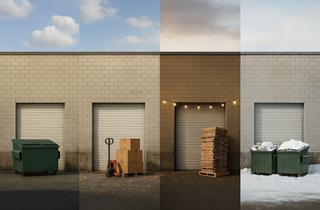Managing seasonal waste spikes in retail: planning for the holiday rush (and off-season lulls)
July 9, 2025
The summer slowdown can be deceptive. One minute, dumpsters are sitting half-full during a quiet spell; the next, the back-to-school rush begins, quickly followed by the holiday frenzy where the back-door roller shutter barely closes between deliveries. Suddenly, you're paying for emergency hauls and messy bin fees.
Seasonality is retail’s heartbeat, yet many stores treat waste as if it were steady. The predictable result is emergency hauls, extra fees, frustrated teams, and sustainability goals placed on hold. With a bit of planning, these headaches turn into small bumps rather than budget shocks. The key is to match your waste strategy to the rhythm of the retail calendar.

Summer slowdown: May to July
Warm weather often brings lower sales and smaller crews, which can hide simmering waste problems. General garbage may sit long enough to attract pests, especially if organics are mixed in. If your city offers food-waste collection, keep that bin near food prep with a tight lid, or explore an organics solution such as an on-site composter. Empty it last thing Saturday so nothing spoils over the weekend.
Summer is ideal for contract housekeeping. Pull last year’s invoices and chart haul counts by week, then share the findings with a trusted advisor. Evirum’s service-agreement review can turn that data into a leaner schedule and clear terms before you ask the hauler to adjust rates. Suppliers tend to negotiate more readily in midsummer when trucks have spare capacity.
Back-to-school build-up: August to October
Traffic rises steadily as students shop for supplies, electronics, and apparel. Packaging is lighter than holiday stock yet more varied, which can confuse both customers and staff. Review signage on customer-area bins in late July. Photos of accepted items beside each opening work better than text alone. If you added a compost option, make sure cup lids, straws, and napkins have clear destinations or they will end up wherever is closest.
Receiving teams can reduce trips to the dock by tackling space hogs first. Flatten corrugated inserts immediately, and break foam blocks into smaller pieces before bagging. Compactor sensors can be fooled by bulky but light loads, so schedule one mid-September pull even if the gauge reads only half full. Overflow during October markdowns is harder to manage and incurs premium rates.
Holiday peak: November to December
The eight weeks from Black Friday through Boxing Day create the largest waste surge of the year. Cardboard volumes can triple, and soft plastics arrive by the bale. If your baler or compactor has not been serviced since summer, schedule maintenance before the rush rather than calling for repairs when boxes are piling chest-high. Many haulers will offer a short-term pickup increase if you give notice in October. Even one extra collection during the busiest fortnight can prevent overflow fees that cost much more.
Back-room workflow matters just as much as pickup frequency. Assign one team member each shift to slice boxes flat and feed the baler; when nobody owns that task, cardboard ends up in every trash can on the floor. Keep clean pallets stacked near receiving and damaged ones on a separate skid so they stay out of mixed garbage. Finally, walk the route from unpacking stations to waste equipment. If staff have to push carts through customer areas, they will cram boxes wherever they can rather than risk delays, so clear a back-of-house path while sales traffic is still moderate.
Post-holiday reset: January to February
As gift returns roll in, the waste mix changes overnight. Instead of full cartons, you meet a wave of hangers, torn shrink wrap, and packaging that has travelled both directions. Set up a temporary returns table where associates can sort items for resale, donation, or disposal. Clear signage such as “REPACK”, “DONATE”, “RECYCLE”, and “LANDFILL” helps quick decisions and keeps sellable goods out of trash bins.
This is also the time to dial back your service plan. Call your hauler during the first week of January and ask for a lighter schedule until foot traffic picks up. Skipping one haul a week through February often offsets the higher costs of December. While the store is quieter, assess problem spots. Are coffee cups turning up in the cardboard bin, or has plastic film spread beyond the baler cage? Use the slower weeks for quick refreshers on recycling basics and contamination penalties.
Spring refresh: March to April
Fixture swap-outs and new patio sets create bulky, awkward waste. Metal racks, acrylic risers, and laminated signs rarely belong in regular dumpsters. Contact a local recycler or waste partner that accepts mixed metals and rigid plastics, then schedule a dedicated pickup during the changeover. Fees are usually lower than sending that weight to landfill, and you save compactor space for day-to-day trash.
Garden furniture and sports stock also arrive wrapped in yards of clear film. Because film is clean and uniform, many processors will pay for it if it is kept separate. Collect the wrap in a tall cardboard box lined with a clear bag; once full, tie it off and store it with bales. This step cuts disposal costs and frees room for higher-value recyclables.
Bringing it all together
A flexible calendar, clear roles, and regular waste assessments turn seasonal chaos into predictable patterns. Start the year by mapping traffic and delivery peaks, then match equipment checks and service changes to that outline. Store managers who adopt this rhythm report fewer emergency calls, lower contamination fees, and happier teams who spend less time wrestling rubbish and more time with customers.
Planning does not need to be complex or expensive. It begins with a short walk-through and a couple of phone calls before each seasonal shift. If you would like a fresh set of eyes, Evirum’s green team can review your setup and supply a straightforward plan at no cost. The sooner waste flows match sales cycles, the sooner you can channel the budget where it belongs: creating a great retail experience all year long.
Ready to transform your retail waste management?
Contact Evirum today for a free consultation and discover how we can help you optimize waste management, reduce costs, and enhance your sustainability performance.
